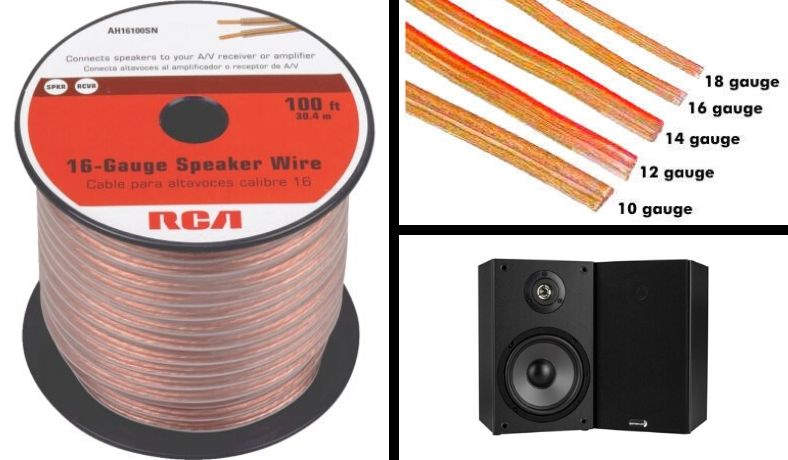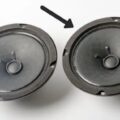When it comes to speaker wire gauges, it can be overwhelming to choose the right one for your audio system. But fear not, we’ll guide you through the basics of gauge wire and what to look for when selecting the best gauge wire for your speakers.
First, let’s talk about what gauge wire is. Gauge wire refers to the thickness of the wire, with lower-gauge numbers indicating a thicker wire, while higher-gauge numbers indicate a thinner wire. The thickness of the wire affects how well it can carry an amplified audio signal.
For most home audio systems, a 16-gauge wire is sufficient for relatively short runs (less than 50 feet) to 8-ohm speakers. It’s cost-effective and easy to work with. However, for longer runs (to another room, for example), it’s better to use a thicker, lower-gauge wire.
Thick wire, such as 12 or 14 gauge, is recommended for long wire runs, high-power applications, and low-impedance speakers (4 or 6 ohms). This is because the thicker wire can handle more current and is less likely to experience resistance, resulting in better sound quality.
It’s important to note that the speaker wire gauge isn’t the only factor that affects sound quality. The quality of the wire itself, as well as the connectors used, can also impact the overall performance of your audio system.
When selecting speaker wire, consider the length of the wire run, the impedance of your speakers, and the power of your amplifier. It’s always a good idea to err on the side of caution and use a thicker wire if you’re unsure.
Choosing the right gauge wire for your speakers can make a noticeable difference in sound quality. While the 16-gauge wire is sufficient for most home audio systems, thicker wire should be used for longer runs and high-power applications. Remember to also consider the quality of the wire and connectors for optimal performance.

The Benefits of Using Higher Gauge Speaker Wire
In terms of carrying an amplified audio signal, a lower-gauge speaker wire is generally considered better than a higher-gauge wire. This is because the lower-gauge wire has a thicker diameter, which allows it to carry more electrical current with less resistance. Resistance can cause a decrease in sound quality, so a thicker wire can help to maintain the integrity of the audio signal. However, it’s worth noting that the difference in sound quality between lower-gauge and higher-gauge wire may not be noticeable in all situations. Additionally, factors such as the length of the wire and the quality of the connectors used can also play a role in the overall sound quality.
Which Gauge of Speaker Wire is Better: 14 or 16?
When it comes to choosing the right speaker wire, the gauge or thickness of the wire is an important factor to consider. The two most commonly used gauges for speaker wire are 14 and 16.
In general, thicker wire (lower gauge number) is recommended for long wire runs, high-power applications, and low-impedance speakers (4 or 6 ohms). This is because the thicker wire has less resistance, which allows for a more efficient transfer of power to the speakers.
On the other hand, for relatively short runs (less than 50 feet) to 8-ohm speakers, 16 gauge wire will usually do just fine. It’s cost-effective and easy to work with.
So, whether you should use 14 or 16-gauge wire depends on the specific circumstances of your setup. If you have long wire runs, high-power speakers, or low-impedance speakers, it’s probably better to go with a 14 gauge wire. But if your wire runs are relatively short and you’re using 8-ohm speakers, 16 gauge wire should be sufficient.
Comparing 16-Gauge and 18-Gauge Speaker Wire
When it comes to choosing between 16-gauge and 18-gauge speaker wires, it’s important to consider the length of the wire run and the impedance of the speakers. For short runs, either gauge will work, but for longer runs, it’s better to use a lower-gauge wire to prevent signal loss and degradation.
In general, 16-gauge wire is thicker and has a lower resistance than 18-gauge wire, which means it can carry a stronger signal over longer distances. This is particularly important for home theater systems or setups where the speakers are located in another room.
However, if you are only running a short distance or have speakers with a high impedance, the 18-gauge wire may be sufficient. It’s always a good idea to consult the manufacturer’s recommendations for your specific equipment to ensure you are using the appropriate gauge wire.
Choosing the right speaker wire gauge can make a significant difference in the quality of your audio signal, so it’s important to take the time to make an informed decision.
Maximum Wattage Capacity of 16 Gauge Speaker Wire
A 16 gauge wire is generally considered suitable for handling up to 15 amps of current. To determine the wattage that can be handled by this wire, we need to use the formula: watts = volts x amps. Assuming a voltage of 120 volts, the maximum wattage that can be handled by a 16 gauge wire is 1800 watts (15 amps x 120 volts). However, it is recommended to stay well below this limit to avoid overheating and other safety concerns. Therefore, it is generally advisable to limit the wattage to around 800 watts or less, to ensure the safe and reliable operation of the wire.
Conclusion
The gauge wire you choose for your speaker system is an important factor to consider. It determines the thickness of the wire, which in turn affects the quality and strength of the audio signal being transmitted. Lower-gauge wires are better for long runs, high-power systems, and low-impedance speakers. On the other hand, for short runs to 8-ohm speakers, a 16-gauge wire is usually sufficient. It is important to note that 16-gauge wire should not be used for more than 15 amps, as this can lead to power limitations. By choosing the appropriate gauge wire for your speaker system, you can ensure that you are getting the best possible audio quality and performance.








